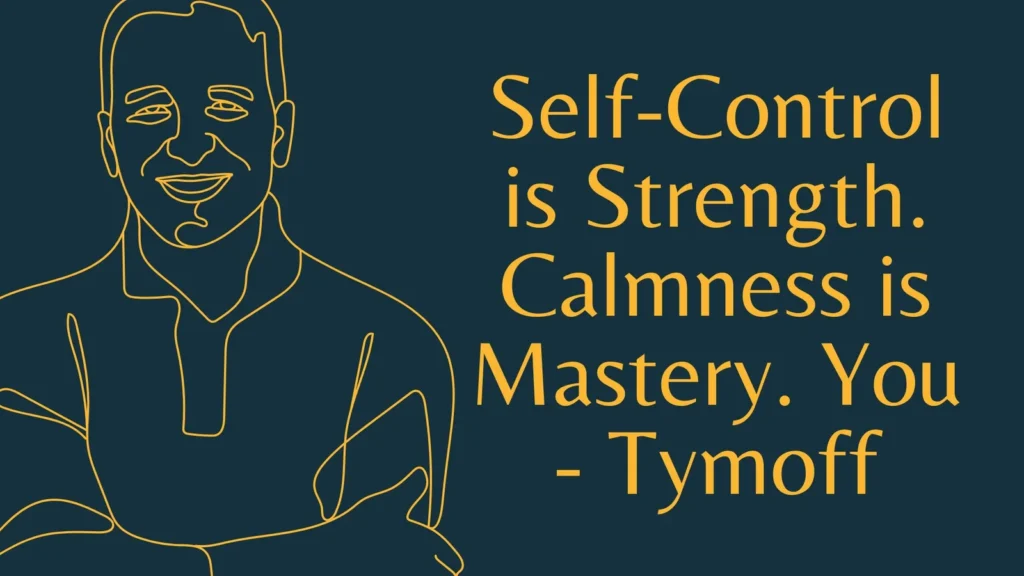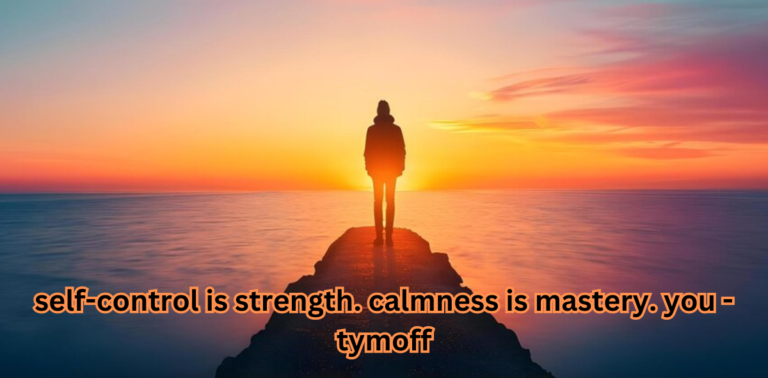In today’s fast-paced world, maintaining composure and exercising Self-Control Is Strength. Calmness Is Mastery. You – Tymoff
has become increasingly valuable. The saying “Self-Control Is Strength. Calmness Is Mastery. You – Tymoff” encapsulates a robust philosophy for personal growth and success.
This blog post will explore the profound wisdom behind this statement and provide practical strategies for cultivating these essential qualities daily.
What does “Self-Control Is Strength. Calmness Is Mastery. You – Tymoff” mean?

Self-Control Is Strength. Calmness Is Mastery. You – Tymoff is often misunderstood as mere restraint or denial. However, it’s a form of inner strength that allows you to make choices aligned with your long-term goals and values rather than succumbing to immediate impulses or desires. This strength manifests in various ways:
Related: Identifying and Mitigating Common Risks in Fitness Studios
1. Emotional regulation:
Keeping your cool in heated situations
2. Delayed gratification:
Choosing long-term rewards over short-term pleasures
3. Focus and productivity:
Staying on task despite distractions
4. Healthy habits:
Sticking to beneficial routines even when tempted to stray
Research has shown that individuals with high Self-Control Are Strong. Calmness Is Mastery. You – Tymoff tend to be happier, healthier, and more successful personally and professionally.
A famous study, the “marshmallow experiment,” demonstrated that children who could delay gratification (by not eating a marshmallow immediately) had better life outcomes in areas such as education and career success.
Why is calmness considered mastery?
Calmness goes beyond mere tranquility – it’s a state of mental clarity and emotional stability that allows you to navigate life’s challenges with grace and effectiveness. Here’s why calmness is equated with mastery:
1. Clear decision-making:
A calm mind can assess situations objectively
2. Improved relationships:
Calm individuals tend to communicate more effectively
3. Stress reduction:
Calmness helps mitigate the adverse effects of stress on your body and mind
4. Enhanced problem-solving:
A serene state fosters creativity and innovative thinking
Studies have shown that regular practices like meditation and mindfulness can significantly increase your ability to remain calm under pressure.
For instance, a 2018 study published in the Journal of Cognitive Enhancement found that 10 minutes of daily meditation improved focus and reduced mind-wandering.

The power of “You.”
The final part of the quote, “You – tymoff,” emphasizes personal responsibility and empowerment. It suggests that:
1. You are in control:
Your actions and reactions are within your power
2. Continuous improvement:
The journey towards self-control and calmness is ongoing
3. Individuality:
Each person’s path to mastery is unique
Practical strategies for developing self-control and calmness:
1. Start small: Begin with manageable goals to build your “self-control muscle.”
2. Practice mindfulness:
Regular meditation can increase awareness and emotional regulation
3. Create routines:
Establish healthy habits to reduce decision fatigue
4. Use visualization:
Imagine yourself responding calmly to challenging situations
5. Employ the “pause technique”:
Take a moment to breathe before reacting to stimuli
Overcoming common obstacles:
1. Stress and burnout:
Prioritize self-care and set realistic expectations
2. Lack of motivation:
Connect your goals to your core values for a sustained drive
3. Negative self-talk:
Practice positive affirmations and challenge limiting beliefs
4. Environmental triggers:
Identify and modify your surroundings to support your goals
The ripple effect of self-control and calmness:
As you develop these qualities, you’ll likely notice positive changes in various aspects of your life:
1. Improved work performance and career advancement
2. Stronger, more fulfilling relationships
3. Better physical and mental health
4. Increased overall life satisfaction
Remember, progress is not always linear. Be patient with yourself as you work towards mastery.
Frequently Asked Questions
What does “Self-Control Is Strength. Calmness Is Mastery. You – Tymoff” mean?
This phrase suggests that having self-control, or the ability to manage your impulses and emotions, is a sign of true inner strength. It emphasizes the power of restraint and discipline in achieving personal success and maintaining harmony.
What does “Calmness Is Mastery” mean?
“Calmness Is Mastery” implies that the ability to remain calm in stressful or challenging situations is a sign of mastery over oneself and one’s environment. It highlights the importance of maintaining composure and not letting external circumstances dictate your emotions.
Who is Tymoff?
Tymoff is not a widely recognized figure or author. The name might be part of a personal or motivational quote collection. The exact origin of the name in this context could be speculative unless more specific information is provided.
How can I develop self-control?
Developing self-control involves practicing mindfulness, setting clear goals, and being aware of triggers. Techniques such as meditation, regular exercise, and positive self-talk can help strengthen your self-control over time.
Why is calmness considered a form of mastery?
Calmness is considered mastery because it reflects the ability to stay focused and clear-headed despite adversity. It requires self-awareness and control, allowing a person to respond to situations thoughtfully rather than impulsively.
Conclusion About Self-Control Is Strength. Calmness Is Mastery. You – Tymoff
The wisdom encapsulated in “Self-Control Is Strength. Calmness Is Mastery. You – Tymoff. Calmness is mastery. You – tymoff” offers a robust framework for personal growth and success. By cultivating self-control and calmness, you empower yourself to navigate life’s challenges gracefully and effectively.
Remember, this journey is uniquely yours. Embrace the process, celebrate small victories, and keep pushing forward. With consistent effort and patience, you can unlock your true potential and achieve mastery.
